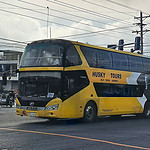NOTE: THIS STORY WAS FIRST PUBLISHED IN THE BOHOL CHRONICLE’S SUNDAY PRINT EDITION.
A twist in the granting of cash benefits to more than 11,000 beneficiaries will contribute to Mother Nature starting June this year.
Gov. Aris Aumentado will issue an Executive Order tomorrow mandating that every beneficiary of the “Tulong Panghanapbuhay sa Ating Displaced Workers” (TUPAD) will be required to plant at least 10 trees during their 10-day work-for-cash program.
The government has allotted P50 million to some 11,363 TUPAD beneficiaries who will be receiving the P4,440 one-time benefit.
“No planting, no cash,” says the governor.
The governor issued the order to town mayors as well as to the Department of Environment and Natural Resources (DENR) to closely coordinate the implementation of the massive tree planting program which will be implemented in June and July when rains are expected.
Once implemented, no less than 113,630 trees can be planted in the province by the TUPAD beneficiaries.
“Instead of simply receiving the cash benefit,” each one of the beneficiaries should be able to plant a tree, according to Gov. Aumentado who reacted sharply on the raging issue of delisting acacia trees among the homegrown trees.
The pronouncement of the DENR surprised the cross-section of the community that cutting centuries-old acacia trees is no longer banned following the delisting of acacia.
TUPAD is a community-based package of assistance that provides emergency employment for displaced workers, underemployed and seasonal workers for a minimum period of 10 days, but not exceeding to 30 days, depending on the nature of work to be performed per DOLE’s guidelines.
LEGAL CONTEST
The claimed delisting of acacia trees is expected to trigger some legal contest while it went viral on social media.
Pilipinas Shell showed in its huge poster covering the area that it got cutting permits from DENR which were four separate numbered Private Tree Plantation Registration (PTPR).
Makati-based Boholano lawyer Jordan Pizarras took the cudgels in questioning the pronouncement of the Department and Natural Resources Bohol (DENR).
The Boholano lawyer said “These are not the permits that are required to be issued prior to the cutting, removal and/or the relocation of naturally growing trees within a private and public forest land pursuant to DENR Administrative Order No. 2021-11. The PTPR is applicable only to trees in a plantation that an individual has planted himself and thus can harvest later.”
Secondly, the PTPR cannot reasonably apply to hundred-year-old heritage trees. No way can the applicant prove that he planted the over one-hundred-year-old tree himself. For this to happen, the applicant-individual-lot owner must be over a hundred years old himself by now. Or have documentation of such a plantation indicated somewhere in the legal proofs of ownership like TCTs (transfer certificate of titles) or whatnot.
Thirdly – does not apply to the cutting of trees located along public roads – in this case, a national road on one side and a city street on the other. For this, the applicant reportedly needs a “Special Permit from the DPWH and the LGU,” Pizarras concluded.



